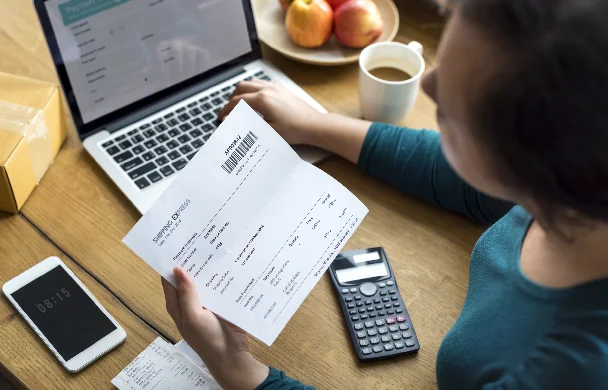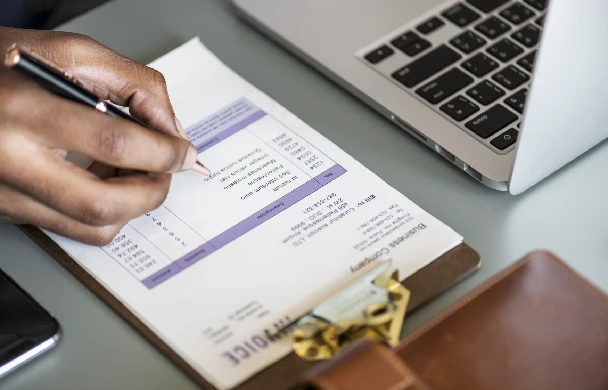
Eway Bill (Electronic Way Bill) under GST e-waybill with Simble Books
A Ewaybill is a document required for the movement of goods worth more than Rs. 50,000 within or between states in India.
Electronic Way Bill (E-Way Bill) is a compliance mechanism wherein by way of a digital interface the person causing the movement of goods uploads the relevant information prior to the commencement of the movement of goods and generates an e-way bill on the GST portal.
Eway Bill contains the following
- Details of the goods being transported
- Name of the Consigner/Seller
- Name of the consignee/Recipient of goods
- The point of origin of the consignment
- Destination, and route


Who should generate an e-way bill?
The supplier or the recipient of goods is required to generate the e-way bill. In the case of unregistered
persons, the e-way bill can be generated by the transporter. If the goods are handed over to a transporter
for transportation by road, E-way bill is to be generated by the Transporter. Where neither the consignor
nor consignee generates the e-way bill and the value of goods is more than Rs.50,000/- it shall be the
responsibility of the transporter to generate it.
How is the e-way bill generated?
An e-way bill contains two parts- Part A and Part B
Part A to be furnished by the person who is sending the goods of the consignment if the value exceeds Rs.50,000/.
Part B (transport details) is to be furnished by the person who is transporting the goods.
Documents required for e-way bill
- Invoice copy to the consignment of goods
- Transport by Road- Transporter ID or Vehicle details
- Transport by rail, air, or ship – Transporter ID, Transport document number, and date on the document
Validity of E-Way Bill
The validity of e-way bill depends on the distance to be traveled by the goods.
For a distance of less than 100 Km the e-way bill will be valid for a day from
the relevant date. For every 100 Km thereafter, the validity will be additional
one day from the relevant date.
Cancellation of E-Way Bill
Where an e-way bill has been generated, but goods are either not transported or
are not transported as per the details furnished in the e-way bill, the e-way bill
may be cancelled electronically on the common portal, either directly or through a
Facilitation Centre notified by the Commissioner, within 24 hours of generation of
the e-way bill.
Exceptions to e-way bill requirement
- The transportation of specific goods, as notified by the GST Council.
- E-way bill is not required for the movement of goods on non-motorized conveyances.
- Exempted Goods: Certain goods, such as agricultural produce, certain notified handlooms, and certain essential commodities, may be exempted from the requirement of an e-way bill.
- Transit of Goods: E-way bill may not be required for goods in transit through any state, i.e., if the destination is outside the state
- Goods Below Prescribed Value: If the value of the goods being transported is below the prescribed threshold, an e-way bill may not be required
- Goods Transported by Specified Agencies: Certain agencies and entities, as notified by the government, may be exempted from generating e-way bills for specific transactions.
Consequences of non-conformance to E-way bill rules
If e-way bills, wherever required, are not issued in accordance with the provisions contained
in Rule 138 of the WBGST Rules, 2017, the same will be considered as contravention of rules.
A taxable person who transports any taxable goods without the cover of specified documents
(e-way bill is one of the specified documents) shall be liable to a penalty of Rs.10,000/- or
tax sought to be evaded (wherever applicable) whichever is greater.
As per Section 129 of WBGST Act, 2017, where any person transports any goods or stores any goods
while they are in transit in contravention of the provisions of this Act or the rules made there
under, all such goods and conveyance used as a means of transport for carrying the said goods and
documents relating to such goods and conveyance shall be liable to detention or seizure.
Finer Points
An e-way bill has to be prepared for every consignment where the value of the consignment exceeds
Rs.50,000/-. Where multiple consignments of varying values (per consignment) are carried in a single
vehicle, e-way bill needs to be mandatorily generated only for those consignments whose value exceeds
Rs.50,000/-. This does not however preclude the consignor/consignee/transporter to generate e-way bills
even for individual consignments whose value is less than Rs.50000/- per consignment. For multiple
consignments being carried in the same vehicle, the transporter to prepare a consolidated e-way bill by
indicating serial number of each e-way bill, on the common prior to commencement of transport of goods.
Why SIMBLE BOOKS for e-way bill?
- Generate your e-way bill in once Click
- One-stop Solution for all EWB needs
- e-Way Bills made simple
- India’s first free e-way bill generator